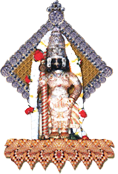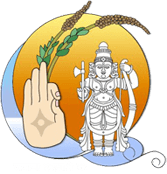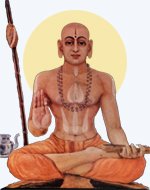
Introduction to the Chapter
There is a brief account of Madhva’s return from Badari Kshetra, when he stayed for a short time in the Ashrama of VedaVyasa and received the specific injunctions from Lord Narayana for composing a new Bhashya in accordance with the correct purport of the Brahma Sutras. The Bhashya would form the keystone of the entire system of philosophy of Tatvavada. The Bhashya was written in Badari itself and was dictated to Sri Satya Tirtha, Madhva’s dear pupil.
There are no details of the return trip except mention of a visit to the Godavari river, where he met Shobhana Bhatta, who became his foremost disciple, called Sri Padmanabha Tirtha.
He converted his own Guru Achyuta Preksha and the senior ascetic of the Matha to his new system. The installation of the Idol of Krishna in the famous temple in Udupi is mentioned briefly in just 4 shlokas. The performance of a sacrifice by the son of his old teacher under the guidance of Madhva is described in a greater number of shlokas.
Madhva’s second visit to Badari Kshetra during which he went again to the Ashrama of VedaVyasa is mentioned in just three shlokas. Many events that happened during his trips to Badari are covered in Chapter 10, though it will be difficult to assign them to the first or second trip. Similarly, there would have been an interval of a few years between the trips, during which many compositions were written by Madhva.
Madhva leaves Narayanashrama
After getting the cordial permission of Narayana, the son of Yama Dharma, who is beginningless, to go (and propagate the system of Tatvavada for the good people) Ananda Tirtha, the foremost of all learned scholars, offered his salutations and started along with VedaVyasa, the Lord of the Vedas leading the way.
Madhva completes his stay in VedaVyasa Ashrama
He went to the other Ashrama (where VedaVyasa resides), and knowing the mind of VedaVyasa, he heard from Him all that needed to be listened to. He left towards the south (to the Badarinath Kshetra).
Madhva with great intellect, was like the ornament worn on the head for all scholars (the greatest scholar), and offered his prostrations to VedaVyasa, the Lord of all the good people of the world, who was eminently suitable for worship and who had a smile on His beautiful and gentle face. Madhva took His leave and left with His approval.
VedaVyasa had no other place of residence dearer to Him than the mind of Madhva and never left it even for an instant. Therefore, Madhva never lost the company of VedaVyasa. (Though they were physically parted, VedaVyasa continued to be in Madhva’s thoughts).
Madhva comes back to Badarikashrama
When Madhva descended the mountain on the way, he appeared ferocious like the playful Lion to the cruel animals of the forests, but he was appearing like a peaceful person giving happiness to gentle animals (like the deer). Thus he showed the appropriate personality to each type of the animals encountered on the way.
When he reached his own people (in Ananta matha), he gave them great happiness, just like Hanuman who brought the news of Sita after crossing the ocean, Krishna, who brought back the Syamantaka gem and Bhimasena, who brought the Saugandhika flowers to Draupadi.
Each of the five or six Brahmins including Agni Sharma brought sufficient food for Madhva and his followers on the same day. Madhva ate all of it at the same time, which is not surprising considering that he is able to eat the entire Universe in Dissolution.
Madhva composes Brahma Sutra Bhashya
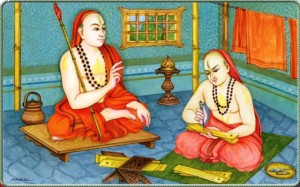
Madhva composed Brahma Sutra Bhashya, which is very dear to the heart of Vyasa Deva (which represents the exact meanings intended by VedaVyasa), which establishes the Supreme Being Vasudeva (Narayana) as the possessor of countless auspicious qualities and free from all defects. It gives correct knowledge and devotion, leading to Moksha.
(Madhva composed Brahma Sutra Bhashya), in which each meaning is fully illustrated by texts quoted repeatedly from the Vedas, which is well explained by texts from Smritis and is supported by the most appropriate reasoning and arguments.
(Madhva composed Brahma Sutra Bhashya), which explains very well the nature of the Supreme being even to people of limited intellect, while even scholars could not completely understand the (depth of) meanings in it. It had used simple words, but its essence was difficult to grasp. It was dear to the good people, but was terrible to its opponents.
He explained very well the nature of the Supreme Being even to people of limited intellect, while even scholars could not completely understand the (depth of) meanings in his words. He had used simple words, but the complete essence of his words was difficult to grasp. He was dear to the good people (or had a pleasant effulgence), but he appeared to be terrible to his opponents.
(Madhva composed Brahma Sutra Bhashya), which had no incorrect usage of words, and had all words fully justified and useful. It had all the prescribed qualities of a Commentary and was revered even by the great gods. It confers merit on those who study it. It was like another form of Madhva himself.
Madhva did not have the defects of desire, anger etc. His words were always true. His body had all the thirty two auspicious qualities. He was worshipped even by the great gods and he conferred merit on those who worshipped him.
Madhva with infinite knowledge composed the wonderful Bhashya on Brahma Sutras, which rejected (with proper basis) all the 21 previous Bhashyas existing on them, and which could not be refuted by any one, in the past, present or future. His Bhashya was thus similar to his form.
Note: Bhavaprakashika lists out the previous Bhashyas on Brahma Sutra: Bharathivijaya, Samvidanada, Brahmaghosha, Shathananda, Udvartha, Vijaya, Rudrabhatta, Vamana, Yadavaprakasha, Ramanuja, Bharthruprapancha, Dravida, Brahmadattha, Bhaskara, Pishacha, Vritthikara, Vijayabhatta, Vishnukrantha, Vadeendra, Madhavadasa, Sankara.
It is unfortunate that we have no texts but only the names of most of these, except Sankara, Bhaskara and Ramanuja, though Yadavaprakasha seems to have been referred to by Ramanuja.
Sri Satyatirtha (his favourite disciple) wrote down the Bhashya, when it was composed. Even writing down one letter of this Bhashya (with devotion) confers as much Punya (Merit) as constructing an excellent effulgent temple of Vishnu on the banks of the holy river Ganga, where the auspicious waves break on its shores.
Note: There is a reference to a copy of the Bhashya being sent in advance by Madhva to his Guru, Sri Achyuta Preksha. It is most unfortunate that there is no document available today, which can be considered as the Original, written by Satya Tirtha in Badari Kshetra. The oldest available manuscript in Tulu script is attributed by tradition to Sri Hrishikesha Tirtha of the Palimaru Matha.
Madhvacharya leaves Badari Kshetra to return
After prostrating to Narayana (installed Icon) in Badari, and with complete respect for the words of his Lord (Narayana) in his heart, PoornaPrajna started his return trip quickly from there. He crossed many lands along with his entourage and reached the banks of the river Godavari.
Madhva reaches a scholar’s assembly on Godavari and refutes other schools
There were many scholars who had come there to secure rewards by demonstrating their scholarship, They knew all the eighteen sections (of the Vedas) and put forward many Shrutis for comment (by Madhva) in examination. Madhva answered and explained all of them. He refuted six prevalent systems of philosophy (Charvaka, Bauddha, Naiyyayika, Vaisheshika, Prabhakara and Bhatta).
They examined Madhva separately in their own sections of the Vedas and their own Siddhanta (school of philosophy) and lost (as his knowledge was greater than theirs). Then they praised him – Oh, Great scholar, you are all-knowing. There is none equal to you.
Shobana Bhatta, a great scholar is converted and becomes Sri Padmanabha Tirtha
There was one scholar in that gathering, who was well versed in all sections of the Vedas and regarded as the greatest scholar in interpreting the Vedas among them. This scholar known as Shobana Bhatta prostrated again and again with great happiness to PoornaPrajna.
He was a great scholar in Nyaya Shastra and had refuted all the schools of philosophy prevalent at that time. He was also well versed with the Vedas, Mahabharata and the Puranas and was following the rituals prescribed therein with great reverence. He became the disciple of Madhva and listened to the exposition of his Bhashya from Madhva himself.
Having heard the Bhashya from Madhva, he was not interested even in the least in studying other Shastras. This is similar to the white swan which has tasted the nectar of the lotus, does not ever want the nectar of other flowers.
Note: Shobana Bhatta named Sri Padmanabha Tirtha was the first major convert to the new Tatvavada philosophy. He was a great scholar with a commanding presence in all fields of study of Shastras – Veda and Upanishads, Mahabharata and other Ithihasas, and Puranas. He had already rejected prevailing schools of Vedanta as unsatisfactory, even before he heard Madhva Bhashya.
The acceptance by Shobhana Bhatta of the tenets of Madhva’s Tatvavada was in the nature of a disciple getting his knowledge cleared of all possible doubts, rather than a debate where he took the specific position of an opponent. Such a scholar found that Madhva had answers to all his questions and became an enthusiastic admirer of his new School. He was the first major speaker after Madhva on his Shaastra and took over the main seat of Madhva’s lineage after him.
Shobana Bhatta refutes other disputants and extols Madhva Shastra
The lustrous Shobana Bhatta refuted the tenets stated by others in different gatherings of scholars by using the syllogisms stated by PoornaPrajna and said the following appropriate words showing scant regard for the other disputants.
A person who was engaged in producing high quality lime by powdering shells (from the sea) was once unable to powder a Conch shell with the reverse whorl, which is extremely precious, even after many attempts using different methods. He concluded that it is useless and threw it away. What a shame?
Any one who gets the rare and heaven sent opportunity to study the Madhva Shastra, similar to the rare and precious Conch shell (in the example given above), which is not easily obtained, and who gives up (does not do) such study is similar in his intelligence to the foolish person, who threw away the shell or there in none who is so evil as him.
God gives the full benefits only according to one’s worth. A person who knew the special value of the Conch shell, (picked it up and) sold it to another for a very large sum of money. Even he did not secure the full benefits from the Conch shell.
Some one with limited intelligence obtains some worldly benefits by the study of Madhva Shastra, but does not secure the main objectives of Jnana and Bhakti (Knowledge and devotion) etc, does not secure the full value of the study of Madhva Shastra, in the same manner as the person who sold the Conch shell.
The great king of excellent deeds who bought the invaluable Conch shell worshipped it constantly with great care and devotion and obtained untold benefits, (such as power, fame, and wealth, and even Mukti) beyond the reach of words and the mind.
The Madhva Shastra is like Kalpa Vriksha (Celestial Tree giving all desires) and can give the most desired fruit of Moksha. But, who can secure such great fruits unless he emulates the King with great qualities? Saying thus, Shobhana Bhatta made the people happy.
When Madhva with revered feet (or excellent conduct or excellent features), published his Bhashya (Shastra) on this occasion, not only was he revered mainly by the great scholars like Shobhana Bhatta, but he was also worshipped with great reverence and happiness by gods like Shiva, Indra, Brihaspathi and others.
Madhvacharya comes back to Udupi
On the way back to Udupi, Madhva taught the new Shastra which removes the miseries of the world to the good people and not to the evil persons. This was like the rain clouds in the rainy season which fill up all the low lying areas, leaving the higher grounds dry.
Doing miraculous deeds on the way, creating wonder and surprise in people, which made them show him great reverence, Madhva came back to Udupi and prostrated to the resplendent deity Ananteshwara (Supreme Lord).
Note: The entire return journey from Badari Kshetra has been covered with only the visit to Godavari being specifically mentioned.
Brahma sUtra Bhashya of Sri Madhwa is accepted by the Senior Ascetic (Likucha family)
Achyuta Prajna saw PoornaPrajna, the beloved of Achyuta, who had come back and prostrated in front of him (Guru) and his happiness was without bounds.
The senior ascetic in the MaTha had seen the Madhva Bhashya sent earlier to him and had been made happy by it. But, when he saw Madhva with the gentle smile, whom he had wanted to see for a long time, he became even more happy.
The senior ascetic was like the rain bearing cloud who had received the bliss giving Ambrosia in the form of the Bhashya from the ocean, PoornaPrajna. He retained it (for himself), even after he gave (taught) its contents to the people (disciples).
Acharya Madhva convinces Guru Achyuta Prajna about the True Knowledge
Achyuta Prajna was a good person innately, but his intellect had been wrongly committed to the Advaita doctrines due to the Kali age. Madhva started patiently describing the good features of his Brahma Sutra Bhashya to him.
PoornaPrajna explained with proper words containing valid reasoning appropriate for each occasion repeatedly to his Guru who had strong leanings towards Mayavada. But he also thought of the reasons due which his Guru continued to have distaste for the new doctrines, just like a doctor finds out the reason for the loss of taste of food by a patient.
The great ascetic Madhva removed the impurities in the mind of his Guru due to Kali by the playful discourse of his excellent tenets, the presentation of his comments with suitable modulation of the voice etc and showing the defects in and unwanted results arising from his previously held faith. This was similar to a regal swan in Manasa sarovara which drove away a crow by the beating it with its wings, and threatening it with loud noises.
The mind of Achyuta Prajna became pure and clear like the moon without the dark spots, a fully flowered lotus and the waters of the autumn season (after rains). Achyuta Prajna who had previously held beliefs in Advaita listened to Madhva Shastra with great pleasure again and again.
This was similar to a person used to drinking water with salt in it (as good water) getting a drink of sweet water again and again with pleasure.
Both Achyuta Prajna and Senior Ascetic preach Madhva Shastra
The two ascetics – the senior ascetic (of Likucha family) and Achyuta Prajna resting in the shelter of Madhva (school of philosophy) removed the ignorance of the illusion caused by Mayavada (Advaita) by the revelation of the good doctrines of Tatvavada day and night. This was similar to the sun and the moon, with their brilliance at the appropriate time, moving in the sky day and night dispelling intense darkness that causes confusion to people.
Madhva does Chakrankana to disciples
Madhva with great love towards the good people, taught the Tatvavada Shastra and placed the ritual markings of the Sudarshana chakra or discus on the body, along with the Shankha or conch. The Discus was similar to his doctrines, which would appear as an enemy to the evil persons naturally and would destroy great and fearful sins in their multitude.
Note: This refers to both the ritual markings on the body and teaching of Madhva Shastra.
Madhvacharya installs Sri Krishna Idol at Udupi
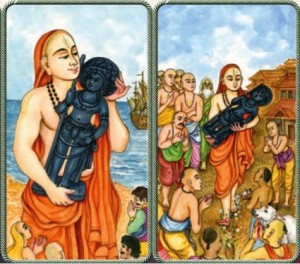
Once, Madhva staying in Udupi, out of great and selfless kindness to the good people, who had no other succor, wanted to provide a remedy to the defects in the form of obstructions in the path of pursuit of Moksha as his main purpose.
PoornaPrajna with the large intellect had the stone idol of Krishna, dear to the Gopikas, washed with water in the pond (Madhva sarovara) by three or four disciples and immersed it in the pond.
Afterwards when Madhva asked thirty persons to move it from the pond, they were unable to do so, as it had become (very heavy) unmovable with his very holy touch giving it the presence of Hari (Krishna). He then carried it alone himself without effort to his Matha (place of stay).
He then installed in the idol by proper rituals, the son of Nandagopa (Krishna), who is worshipped by gods and is beautiful. He has a face with a beautiful and gentle smile. His divine form is not visible to the physical eyes.
Note: Shrimadhvavijaya does not mention the origin of the Idol (believed to have arrived from Dwaraka in a ship), the composition of Dvadasha Stotra at the time etc. This would appear to indicate that when Shrimadhvavijaya was written, the installation was already an old event and in keeping with his method of ascertaining facts etc for inclusion in the Epic, Narayana Panditacharya has taken the barest essentials and included them here But, the stories of the origin of the Idol appear to have strong foundation as the story is found in many compositions and works of Aparoksha Jnanis.
Acharya Madhva goes Badari Kshetra second time and returns to Udupi
Madhva, with great knowledge crossed many rivers (like Krishna, Godavari etc), which support living beings with their water, mountains such as Vindhya etc. and reached Badarikashrama, dear to VedaVyasa easily, in the same manner as he took Sannyasa.
Sri VedaVyasa being fully pleased with the compliance of His desire by Acharya Madhva gave him in a special manner the unique Sahabhoga (appropriate to the status of Chaturmukha Brahma), which He (as Rama) had given earlier to Hanuman (the earlier incarnation of Madhva), which is not given to any one else, as He had nothing more appropriate to give him.
Note: On this occasion, Madhva presented his Brahma Sutra Bhashya to VedaVyasa, as his offering. This was accepted with great pleasure and Madhva was rewarded with a unique gift which is obtained only by the highest class of souls.
Madhva, who is like the ocean of great deeds and is all knowing prostrated to his Guru, VedaVyasa and received humbly His appropriate orders, which are beneficial to the world. He returned to Udupi along with his disciples and was greeted with great happiness by his devotees. He offered his prostrations to the Lord Anantasana.
Note: The description of the second visit to Badari Kshetra consisting of only three shlokas, is silent about the events on the way. Some of these are described in Chapters 10 and 16 later. They may have been grouped together in the form of a recitation of Acharya Madhva’s great doings, which may have been attempted even earlier to the writing of Shrimadhvavijaya, by other disciples.
The Ninth chapter of Shrimadhvavijaya Mahakaavya written by Sri Narayana Panditacharya, son of Sri Trivikrama Panditacharya concludes here.
| Chapter 8 | Index | Chapter 10 |
